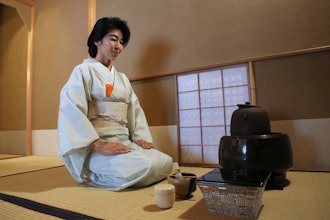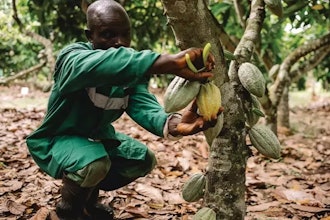MULBERRY, Ark. (AP) — A processing plant that opened here this year is moving Arkansas one step closer to becoming the first state in the nation to commercially produce edamame, a popular food in Asia that's seeing increasing U.S. demand.
Edamame — green soybean pods or seeds — are usually steamed or served cold as a side dish or in salads and soups.
A vegetable, edamame (pronounced eh-dah-MAH-may) is the same species as the field soybean. The field variety of soybean is Arkansas' second-highest-valued agricultural commodity behind broilers and its most valuable crop at nearly $1.5 billion in 2011, according to a report from the University of Arkansas Division of Agriculture Research and Extension. Typically 3.5 million acres of soybeans are planted each year in the state.
Edamame is rare in the U.S., although for more than2,000 years it has been raised to produce sweet flavored, larger beans with a creamy texture. The bean pods tend to be larger and are harvested earlier than traditional soybeans. The vast majority of edamame consumed in the U.S. is imported from Asia, but American Vegetable Soybean and Edamame Inc. wants to change that.
"Made in the USA is our biggest goal here," company President J.Y. "Gene" Chung said in a recent interview at the company's plant.
He said production numbers for the plant's first season, which ended in October, were less than he hoped, but the quality of the edamame was excellent. Chung pointed to the extremely hot weather this summer as one factor limiting the edamame yields and said he was hopeful next year's production rates would be more satisfactory.
He said a key element to improve yields is approval of herbicides for use on edamame in the U.S. Edamame, as a vegetable, has more stringent residue requirements to meet, and Chung said he hopes more herbicide options will be available for next year's growing season.
Lanny Ashlock, research coordinator of University of Arkansas special programs and director of research for the Arkansas Soybean Production Board, told the Arkansas Democrat-Gazette http://is.gd/pwkMKp ) that efforts are under way to gain approval of two or three herbicides for use in the 2013 growing season.
He said that since edamame is virtually unknown as a U.S. consumer crop, there were few, if any, herbicides approved by the Environmental Protection Agency for use on the plants.
"What we had was severely limited and only partially effective," Ashlock said.
He said he is hopeful that funding for research by the Arkansas Soybean Production Board will gain approval and result in products that can be produced and approved for use on the edamame crop in Arkansas.
Ashlock said the reaction by Arkansas farmers to the new crop has been good and he's heard talk of some farmers expanding their acreage for next year. He estimated that 1,000 acres were planted with edamame in 2012 in Arkansas.
American Vegetable Soybean and Edamame Inc., which often goes by AVS, provided the seed and harvested the crop, something the farmers welcomed, he said.
"All in all, we were well pleased," Ashlock said of the first season.
The edamame processed at the Mulberry plant this year came from more than a dozen Arkansas farmers in the Arkansas River Valley. With a 90-day growing season compared with the standard 120 days for field soybeans, farmers can grow a second crop of edamame or an entirely different crop, giving them more flexibility, Chung said.
The Arkansas edamame will be distributed by AVS' parent company, JYC International, a major edamame importer based in Houston. Chung founded JYC in 2002. The company serves Costco Wholesale, Sam's Club, and major grocery stores, according to its website.
The state provided incentives for the AVS plant, according to information provided by the Arkansas Department of Economic Development Commission.
AVS takes part in Advantage Arkansas, a 2 percent income tax credit for the payroll of new jobs for five years; and Tax Back, which refunds sales tax on building material taxable machinery and equipment associated with the project.
The company also has a bond guaranty of $4.31 million, with $2,155,000 from the commission and an equal amount from the Arkansas Development Finance Authority. AVS also obtained a $700,000 loan for working capital through the authority and a Community Development Block Grant loan of $980,000.
But the incentives weren't the only driver, Chung said. Arkansas is proving to be a good testing ground for the edamame project. He said the combination of available water, soil and climate and support from the University of Arkansas and state and local governments have aligned to give the project a fighting chance.
"This is the right place," Chung said.
Mulberry Mayor Gary Baxter agrees. He said the AVS plant is bringing jobs to his town and the surrounding area and that other city businesses have provided services for the new operation.
Mulberry, in Crawford County, has a population of about 1,655. The county's unemployment rate was 6.9 percent with a labor force of 27,300 in September, down from 8 percent with a labor force of 27,500 for the same period last year. The state's unemployment rate for September was 7.1 percent, down from 7.3 percent for the year earlier.
About 40 workers are employed at the Mulberry plant. They process edamame during the harvest season and package the frozen beans over the rest of the year.
Chung said the process is automated but the company still uses a lot of labor to keep product quality high.
"Human eyes are still best for inspection," he said.
The edamame seeds for the first year crop were a mix of a Chinese variety and a type developed by Pengyin Chen of the University of Arkansas System Division of Agriculture's soybean breeding program.
The vegetable soybean variety Chen developed was named the UA Kirksey to honor Joe Kirksey of Mulberry, former president of the Arkansas Soybean Promotion Board and vice president of the American Soybean Association.
Chung said both seeds performed well and the Chinese variety managed to adapt to the Arkansas climate.
"Next year, we'll plant more," he said.






















